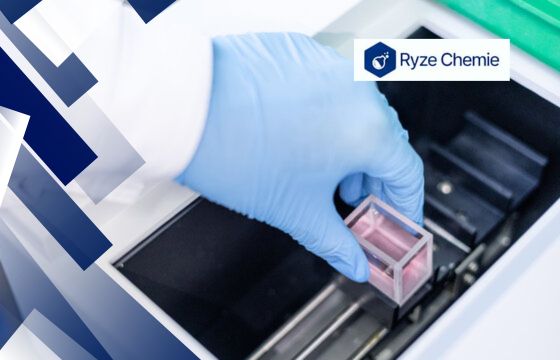
Stay up-to date on the
latest blogs. Join our
newsletter today!
This site is protected by reCAPTCHA and the Google Privacy Policy and Terms of Service apply.
Research Project Management: 10 Essential Tips (2024)

Written by Team Ryze Chemie
8 mins read · May 19, 2024

Managing research projects can be overwhelming. Tight deadlines, complex tasks, and unexpected issues add stress to your daily routine. We understand the challenges you face in the lab.
The good news is that effective project management can make your work easier and more efficient. This article will provide you with ten essential tips to streamline your research projects.
Whether you're planning experiments or coordinating with your team, these practical strategies will help you stay organized and on track.
10 Essential Tips for Research Project Management
Successful research with chemicals requires not just scientific expertise but also strong project management skills. Here are 10 key tips to ensure your research runs smoothly and achieves its goals:
1) Define Project Scope and Goals Clearly
- Start by clearly outlining your research question. What are you trying to learn or achieve?
- Define your project objectives. What specific steps will you take to answer your research question?
- Specify the deliverables of your project. What results or products do you expect at the end?
- Consider safety protocols and regulations related to the chemicals you'll be using. Make sure your project adheres to all safety guidelines.
Work Breakdown Structure (WBS): A WBS breaks down your project into smaller, more manageable tasks. This helps you visualize the project workflow and identify dependencies between tasks.
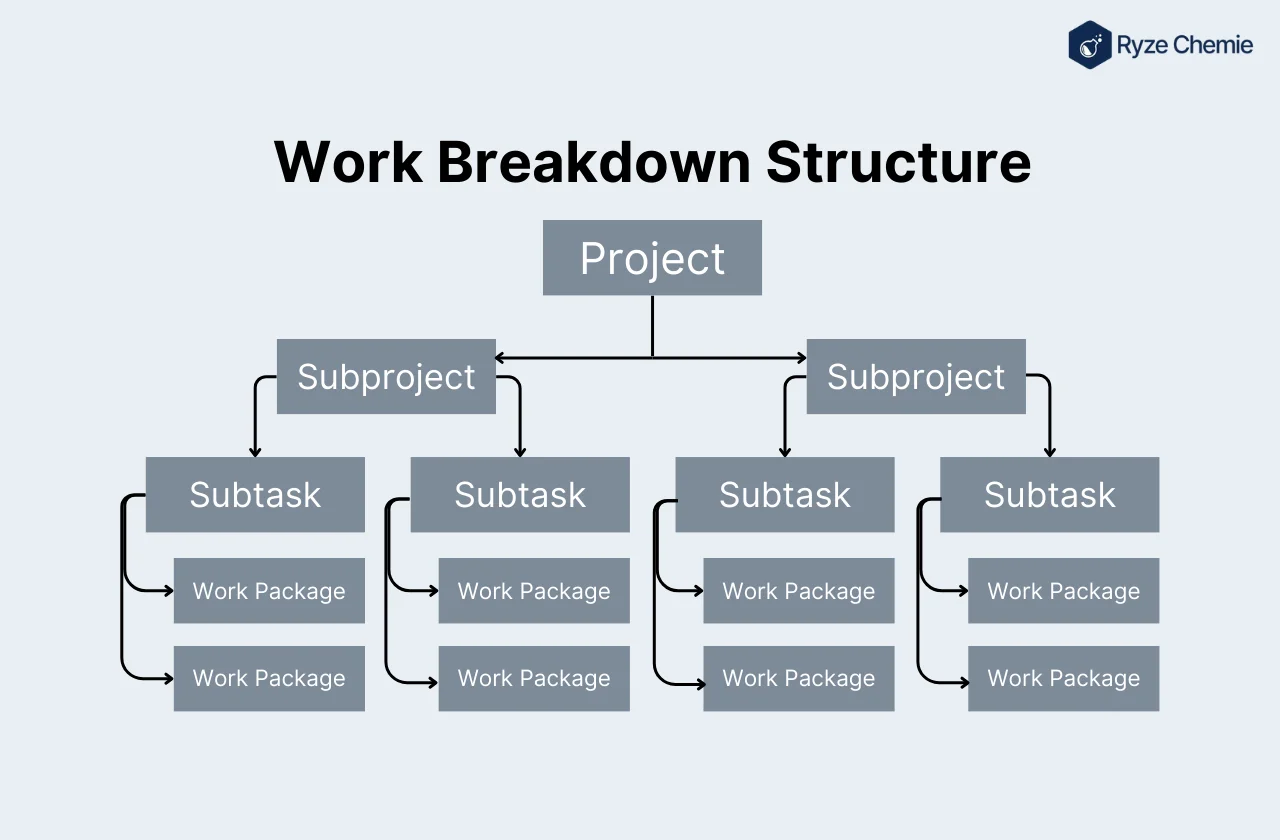
2) Develop a Detailed Timeline and Schedule
- Create a realistic timeline for your project, including deadlines for each task. Factor in buffer time for potential delays due to unexpected results or material shortages.
- Consider procurement lead times for chemicals and equipment. Order supplies well in advance to avoid delays in your research schedule.
Gantt Chart: A Gantt chart is a visual tool that displays your project schedule. It shows the start and end dates of each task, allowing you to easily track progress and identify potential bottlenecks.
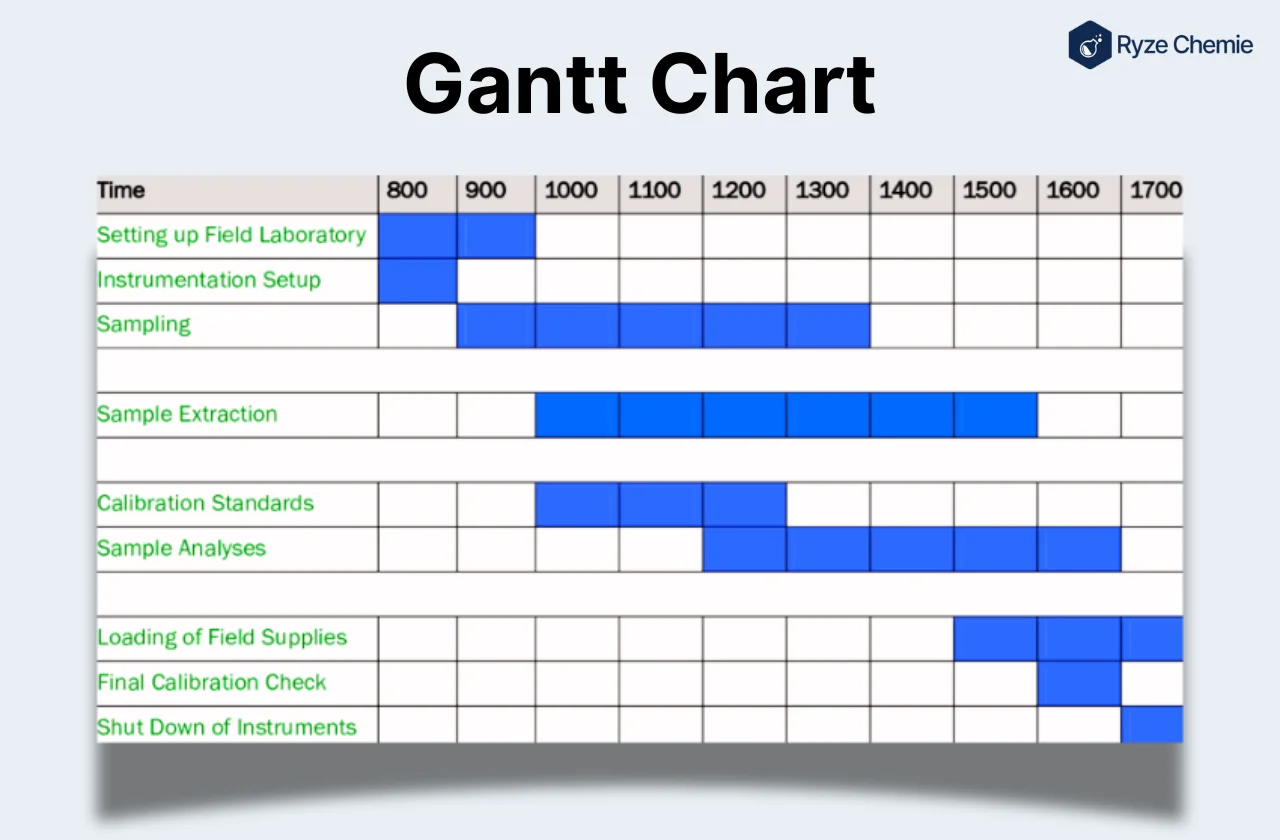
3) Identify and Manage Resources Effectively
- Identify all the resources you need for your project, including personnel, equipment, chemicals, and funding. Make sure you have everything you need before starting your research.
- Develop strategies for managing resource allocation. This might involve prioritizing tasks that require specific equipment or allocating chemicals efficiently.
- Maintain an inventory of chemicals. This helps you track usage and ensure you have enough supplies for the project. Develop proper disposal procedures for waste chemicals according to safety regulations.
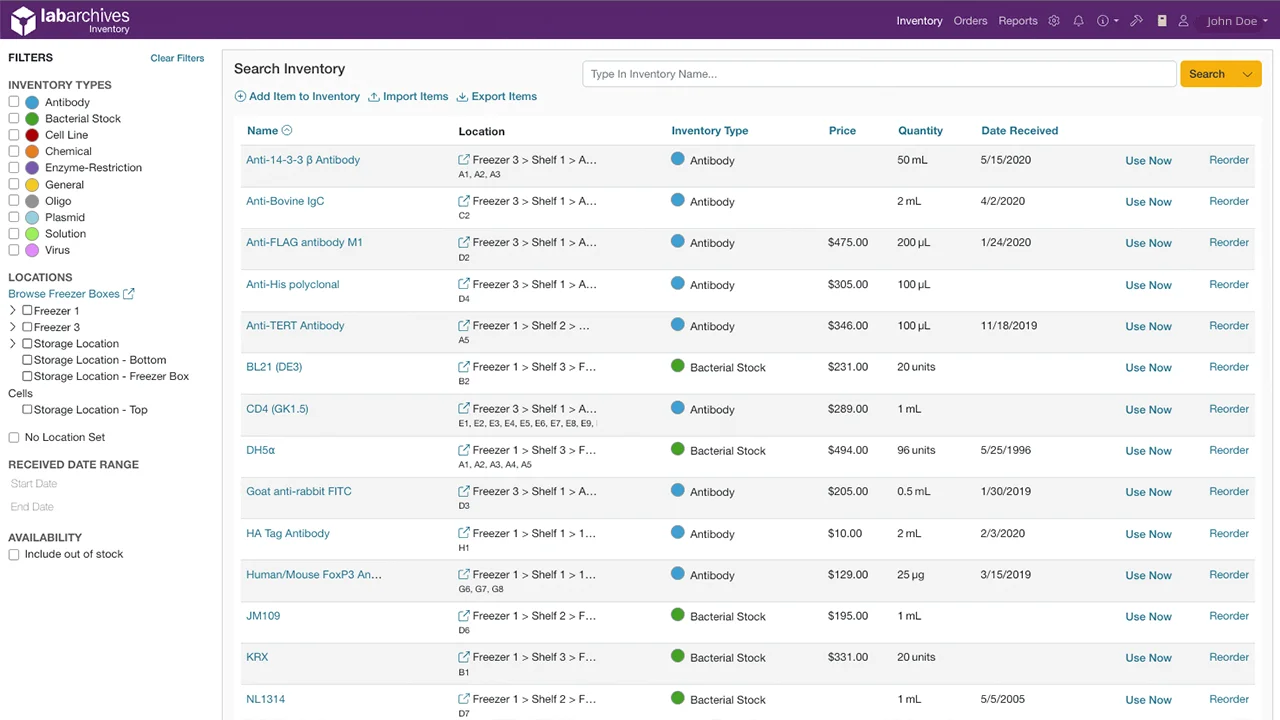
4) Prioritize Tasks and Risks
- Prioritize your research tasks based on their importance and dependencies. Some tasks may need to be completed before others can begin.
- Identify potential risks associated with your project, especially those related to the chemicals you'll be using.
- Develop risk assessment and mitigation strategies. This involves evaluating the likelihood and severity of each risk and taking steps to minimize them. Tools like FMEA (Failure Mode and Effects Analysis) should be considered to identify potential issues.
5) Leverage Project Management Tools
- Project management software like Asana or Trello can help you manage tasks, collaborate with team members, and track progress. These tools can keep your project organized and ensure everyone is on the same page.
- Electronic lab notebooks (ELNs) are digital tools for recording data and tracking experiments. ELNs make data management and sharing more efficient and secure.
- Choose tools that are compatible with chemical safety protocols and data security best practices.
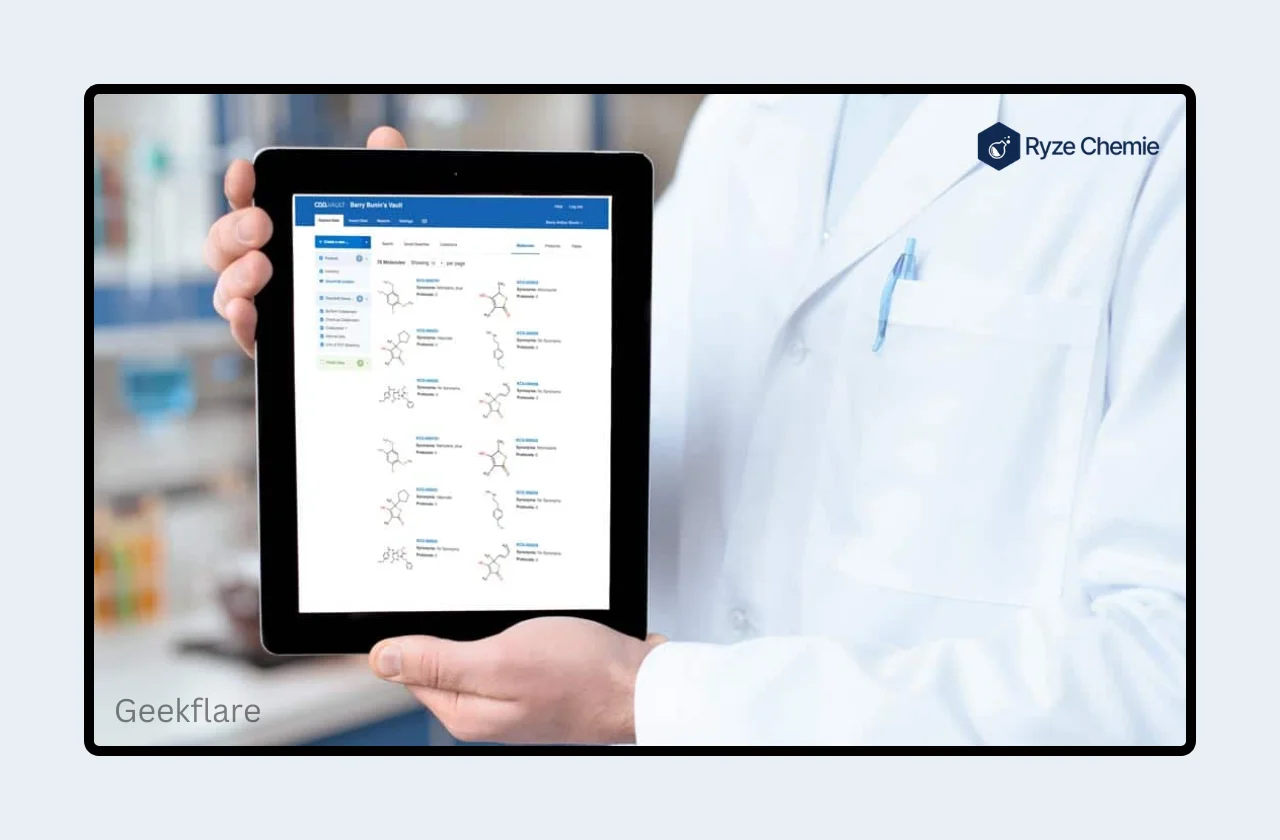
6) Maintain Clear Communication and Documentation
- Maintain clear and regular communication with all lab personnel involved in the project. Share updates, discuss challenges, and ensure everyone understands their roles.
- Document your procedures, data analysis, and safety protocols thoroughly. Clear documentation ensures reproducibility and protects valuable research data.
- Use version control for your documentation. This allows you to track changes and revert to previous versions if necessary.
7) Conduct Regular Project Reviews
- Schedule regular lab meetings to discuss project progress, address challenges, and adjust the plan as needed. These meetings are essential for keeping your research on track.
- Project milestones are key points in your project schedule that mark significant progress. Regularly review your progress against these milestones to identify areas needing attention.
8) Foster a Culture of Safety and Collaboration
- Safety is paramount in any research project involving chemicals. Promote a safety-first culture in your lab and ensure everyone understands and follows safety protocols.
- Teamwork is essential for successful research. Encourage open communication, mutual respect, and collaboration among lab personnel.
- Create an environment where everyone feels comfortable reporting safety concerns and near-misses promptly. Addressing potential hazards early can prevent accidents.
9) Adapt and Be Flexible
- Research rarely goes exactly according to plan. Unexpected results or delays can occur.
- Be flexible and adapt your project plan as needed. Don't be afraid to adjust your approach based on your findings.
- Develop contingency plans to address unforeseen circumstances. This helps you minimize disruptions and keep your project moving forward.
10) Celebrate Milestones and Learn from Experiences
- Acknowledge achievements and milestones throughout the project. Celebrate successes and recognize the hard work of your team.
- Conduct project debriefs after completion. Discuss what went well, what could be improved, and how these lessons can be applied to future projects.
- Embrace continuous improvement in your research project management practices.
Conclusion
Effective research project management is essential for success in any lab. By following these ten tips, you can streamline your processes, enhance collaboration, and achieve better results.
Always plan meticulously, communicate clearly, and stay flexible to adapt to changes. Keep track of your progress and celebrate milestones to maintain motivation. By managing your projects well, you not only achieve your goals but also contribute to scientific advancements.
Remember, great management leads to great science. Let's keep pushing the boundaries and making impactful discoveries together!
FAQs related to Research Project Management
1) What is project management for research?
Project management for research is like organizing a complex experiment. It's about planning all the steps involved in your research project, from the initial idea to the final report. This includes setting goals, creating a timeline, assigning tasks, managing resources (like chemicals and equipment), and keeping track of progress. Good research project management helps ensure your project stays on track, meets deadlines, and delivers valuable results.
2) What is the role of a research project manager?
The research project manager is the captain of the research ship! They oversee the entire project, making sure everything runs smoothly. Their tasks include:
- Planning and Scheduling: They break down the research project into smaller, more manageable tasks. They then create a timeline that shows when each task needs to be completed.
- Resource Management: They make sure the project has the right people, equipment, and materials to succeed. This might involve ordering chemicals, scheduling lab time, and assigning researchers to specific tasks.
- Communication: They keep everyone involved in the project informed about progress and any changes. This means holding regular meetings, sending updates, and keeping everyone on the same page.
- Budgeting: They track the project's expenses and make sure the research stays within budget. This might involve requesting funding, managing grants, and keeping an eye on costs.
- Risk Management: They identify potential problems that could derail the project and develop plans to address them. This could be anything from a shortage of a specific chemical to unexpected results.
3) How to manage research projects?
Here are some key steps to effective research project management:
- Define your goals: What are you trying to achieve with this research? Clearly defined goals will guide your project and help you stay focused.
- Develop a research plan: This is like a roadmap for your project. It outlines the methods you'll use, the data you'll collect, and the timeline for each step.
- Assemble your team: Choose qualified researchers with the skills and expertise needed to complete the project.
- Communicate effectively: Regularly discuss progress with your team and address any issues that arise.
- Track your progress: Monitor your project against the timeline and budget. Make adjustments as needed.
- Document everything: Keep detailed records of your research methods, data, and results. This will be crucial for writing reports and sharing your findings.
4) What are the research areas of project management?
Research project management techniques can be applied to many areas of scientific research, including:
- Chemical synthesis: Plan and execute experiments to create new molecules.
- Analytical chemistry: Developing and applying methods to analyze the composition and structure of materials.
- Biochemistry: Studying the chemical processes that occur in living organisms.
- Environmental science: Researching the impact of human activity on the environment.
- Materials science: Developing new materials with specific properties.
By following these steps and adapting them to your specific research area, you can effectively manage your research project and ensure it delivers valuable scientific findings. Remember, good project management isn't just about following a rigid plan – it's about being flexible and adapting to new information and challenges as they arise.
Latest Blogs





